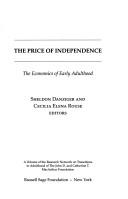| Listing 1 - 10 of 30 | << page >> |
Sort by
|
Book
Year: 2007 Publisher: Cambridge, Mass. National Bureau of Economic Research
Abstract | Keywords | Export | Availability | Bookmark
 Loading...
Loading...Choose an application
- Reference Manager
- EndNote
- RefWorks (Direct export to RefWorks)
Book
Year: 2004 Publisher: Cambridge, Mass. National Bureau of Economic Research
Abstract | Keywords | Export | Availability | Bookmark
 Loading...
Loading...Choose an application
- Reference Manager
- EndNote
- RefWorks (Direct export to RefWorks)
Book
Year: 1997 Publisher: Cambridge, Mass. National Bureau of Economic Research
Abstract | Keywords | Export | Availability | Bookmark
 Loading...
Loading...Choose an application
- Reference Manager
- EndNote
- RefWorks (Direct export to RefWorks)
Book
Year: 1994 Publisher: Cambridge, Mass. National Bureau of Economic Research
Abstract | Keywords | Export | Availability | Bookmark
 Loading...
Loading...Choose an application
- Reference Manager
- EndNote
- RefWorks (Direct export to RefWorks)
Book
Year: 1997 Publisher: Cambridge National Bureau Of Economic Research. Working Paper Nr. 5964
Abstract | Keywords | Export | Availability | Bookmark
 Loading...
Loading...Choose an application
- Reference Manager
- EndNote
- RefWorks (Direct export to RefWorks)

ISBN: 9780871543165 Year: 2007 Publisher: New York, N.Y. Russell Sage Foundation
Abstract | Keywords | Export | Availability | Bookmark
 Loading...
Loading...Choose an application
- Reference Manager
- EndNote
- RefWorks (Direct export to RefWorks)
Book
Abstract | Keywords | Export | Availability | Bookmark
 Loading...
Loading...Choose an application
- Reference Manager
- EndNote
- RefWorks (Direct export to RefWorks)
Book
Year: 1999 Publisher: Cambridge, Mass. National Bureau of Economic Research
Abstract | Keywords | Export | Availability | Bookmark
 Loading...
Loading...Choose an application
- Reference Manager
- EndNote
- RefWorks (Direct export to RefWorks)
One of the best documented relationships in economics is the link between education and income: higher educated people have higher incomes. Advocates argue that education provides skills, or human capital, that raises an individual's productivity. Critics argue that the documented relationship is not causal. Education does not generate higher incomes; instead, individuals with higher ability receive more education and more income. This essay reviews the evidence on the relationship between education and income. We focus on recent studies that have attempted to determine the causal effect of education on income by either comparing income and education differences within families or using exogenous determinants of schooling in what are sometimes called natural experiments.' In addition, we assess the potential for education to reduce income disparities by presenting evidence on the return to education for people of differing family backgrounds and measured ability. The results of all these studies are surprisingly consistent: they indicate that the return to schooling is not caused by an omitted correlation between ability and schooling. Moreover, we find no evidence that the return to schooling differs significantly by family background or by the measured ability of the student.
Book
Year: 2005 Publisher: Cambridge, Mass. National Bureau of Economic Research
Abstract | Keywords | Export | Availability | Bookmark
 Loading...
Loading...Choose an application
- Reference Manager
- EndNote
- RefWorks (Direct export to RefWorks)
In this paper we study the effects of the threat of school vouchers and school stigma in Florida on the performance of "low-performing" schools using student-level data from a subset of districts. Estimates of the change in school-level high-stakes test scores from the first year of the reform are consistent with the early results used by the state of Florida to claim large-scale improvements associated with the threat of voucher assignment. However, we also find that much of this estimated effect may be due to other factors. While we estimate a small relative improvement in reading scores on the high-stakes test for voucher-threatened/stigmatized schools, we estimate a much smaller relative improvement on a lower-stakes, nationally norm-referenced, test. Further, the relative gains in reading scores are explained largely by changing student characteristics. We find more evidence for a positive differential effect on math test scores on both the low- and highstakes tests, however, the results from the lower-stakes test appear primarily limited to students in the high-stakes grade. Finally, we find some evidence that the relative improvements following the introduction of the A Plan by low-performing schools were more due to the stigma of receiving the low grade rather than the threat of vouchers.
Book
Year: 2001 Publisher: Washington, D.C. : World Bank, Poverty and Human Resources, Development Research Group
Abstract | Keywords | Export | Availability | Bookmark
 Loading...
Loading...Choose an application
- Reference Manager
- EndNote
- RefWorks (Direct export to RefWorks)
Labor unions --- Wages
| Listing 1 - 10 of 30 | << page >> |
Sort by
|

 Search
Search Feedback
Feedback About UniCat
About UniCat  Help
Help News
News